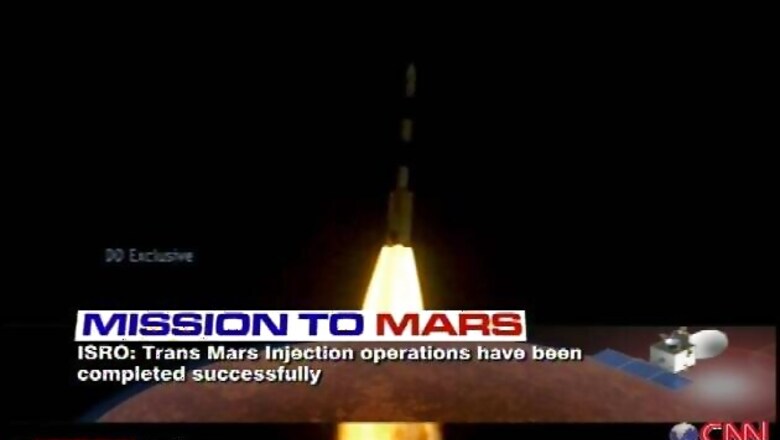
views
Bangalore: The Indian Space Research Organisation's (ISRO) Mars Orbiter Mission (MOM) completed yet another milestone when it was slung out of the earth's orbit in a Saturday midnight manoeuvre.
The MOM, set to reach the red planet in September 2014, is showing all signs of taking India's dreams to new heights. With the 22-minute long slingshot manoeuvre that fired up the spacecraft's engines, the craft is now out of the earth's orbit and on its course to its final destination of a Martian orbit.
The manoeuvre was carried out around 00.49 hours IST on the intervening night of November 30 and December 1. There were some anxious moments, as data on its status was not immediately available from a ground station in South Africa because of weather issues.
But the excitement was palpable not just among ISRO scientists, but among science enthusiasts around the world. ISRO's hugely popular facebook page -- https://www.facebook.com/isromom -- had common citizens on edge, watching out late into the night, asking for instant and live updates.
Considering that more than half the missions to Mars around the world have failed - and that no country has succeeded in its first mission - there is almost breathless waiting in the ISRO community. The Mars craft will reach its Martian orbit after 10 months - in September 2014 - and then carry out designated experiments while orbiting Mars for the next six months.
Here's what Programme Director Dr Mylswamy Annadurai said in an exclusive interview, hours after the Sunday manoeuvre:
CNN-IBN: Tell us about the manoeuvre itself.
Dr Mylswamy Annadurai: With respect to Isro's missions, this particular manoeuvre we rarely do - we have only done it once with Chandrayaan. But this manoeuvre - and with the energy from it - the mission craft will travel nearly 680 million kms. This is, to date, none of Isro's missions have taken such a long way... and elsewhere too, satellites have not done such manoeuvres. That's why we called it the mother of all manoeuvres. It went flawlessly, as planned.
CNN-IBN: In three days, there's further navigation?
Dr Mylswamy Annadurai: Yes another milestone is expected. MOM goes totally out of the sphere of earth's influence. All along from November 5th (when it was launched), till now, it was orbiting the earth. It was with this manoeuvre that it acquired the velocity to escape from earth's influence. But that completes 72 hours after the actual operation (Trans-Mars interjection/ manoeuvre), so three days from now, it will go completely out of earth's sphere so that's another point to watch for.
CNN-IBN: I believe there was some anxiety with no data being received at one ground station?
Dr Mylswamy Annadurai: This is at a South African ground station where because of a local thunderstorm, disruption happened. But that's also another testing moment to see how good the mission's autonomy worked. So without ground contact, it has done its function. Before going to Mars orbit where it is supposed to do its own manoeuvring without ground contact ... remember even there it takes 30- 40 minutes to carry out signals - it has already shown it has done its job perfectly. So that way, it's a blessing in disguise, we can tell you.
CNN-IBN: So the craft can function independently?
Dr Mylswamy Annadurai: Yes, though it was not planned that way, the ground intervention or disturbance that happened - inspite of that, the Mars orbiter has done its job perfectly, indicating all systems are working flawlessly.
CNN-IBN: There are already efforts on to see whether the time-span of the mission - after it reaches Mars - can be increased? Considering there is enough fuel on board?
Dr Mylswamy Annadurai: Well, if you look at any international space agency worldwide, they design missions for a particular duration - based on what is the intended minimum life required so that the overall mission objective is met. So we are talking about six months as the minimum time required for the objectives to be met from all science and technology (experiments, research) point of view - to reach Mars and being around Mars for six months. But if everything goes ok, nothing stops us to go from taking stock of how the systems are working, and extending the mission if possible. That's one step ahead, first we have to ensure the minimum mission (purpose) is guaranteed. Then we think about extending the mission.
CNN-IBN: The next major milestone will be in September 2014, ten months from now, when you will have to inject the spacecraft into Mars orbit by slowing it down?
Dr Mylswamy Annadurai: The overall mission has five stages - first stage, within the budget and schedule, to release the satellite. Then, launching within the launch window. Those two stages are done. Next, what we're doing now - taking the orbiter all the way to the point of injecting into Mars orbit. The fourth stage is to put it around Mars. Then comes the fifth stage, carry out payload operations (that is, operating the 'payloads' or scientific instruments to carry out experiments of Martian surface). The fourth and fifth stages are crucial.


















Comments
0 comment